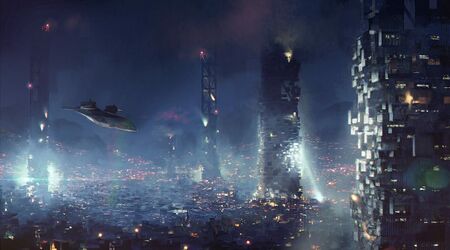Cyberpunk

Cyberpunk is a setting aesthetic based on the exploitation of cutting-edge technology by human society to create Dystopia. The setting takes place in big-ass futuristic cities that are extremely shitty places to live, what with 80% being ghettoes and industrial sectors. The characters in a cyberpunk are technophiles who are always at least 30% metal and cybernetics/bionics. Some of the most common tropes in cyberpunk are gangs of "wired" thugs who use their built in advantages to mug people, massive corporations that have taken over the government, leather-clad edgy hacker antiheroes who stumble across engineered AIs made by said corporations to wipe out the poor, and there's at least one scene with a fat guy wearing a VR set having sex with an anime waifu robot or something. Essentially, Cyberpunk is a deconstruction of the "traditional science fiction" of the 50's and 60's, especially its depiction of futuristic (often utopian) societies. Cyberpunk posits that Technology doesn't automatically make society better, because people will still treat other people like crap, and ever-advancing tech will become just another means of obtaining an advantage or fulfilling one's self-indulgences.
Because of its origins in the late 70's and early 80's, Cyberpunk settings tend to feature Japan as a/the dominant world power. At the start of the 1980's, the Japanese economy was still rapidly growing faster than even the United States. Asian brands were toppling global giants, particularly in consumer electronics and entertainment. The megacorps which are a hallmark of the Cyberpunk stories are caricatures of the Japanese keiretsu. Keiretsu were (and remain) extremely large, vertically and horizontally integrated business groups, each consolidated around their own private bank. The largest groups, such as Mitsubishi or Sumitomo, own interests in virtually every industry from farming to entertainment to heavy manufacturing. These gave rise to the Cyberpunk cliche of companies that are essentially superpowers, untouchable by mere governments which they have bought and paid for, and fearing only the meddling of their competitors.
Notable Cyberpunk traditional games include Shadowrun, Cyberpunk 2020 and Netrunner. GURPS Cyberpunk also exists, and the house of the writer for it was infamously raided by the FBI. Cyberpunk has gotten popular again due primarily to a recent rise in cyberpunk video games: particularly Deus Ex Human Revolution, but upcoming Cyberpunk 2077 and Net Runner (made by a fa/tg/uy) also look liable to introduce the genre into the sphere of computer-aided gaming.
Many recent works colloquially known as Cyberpunk are actually what is known as "Post-Cyberpunk", a pseudo-genre which plays down the Asian themes (as its kinda hard to see Japan taking over everything after its economy crashed in the 90's and sociopolitical issues sent its birth rate on a downward sprial) and grimdark a bit (i.e. your boss in Deus Ex HR at one point orders you to help him save wounded co-workers first; contrast with the normal cyberpunk CEO screwing everyone else in order to save their ass). Calling something Post-Cyberpunk can be problematic depending on who you talk to, because it can be interpreted as a derogatory labeling. Where Cyberpunk is gritty and oppressive, Post-Cyberpunk takes the same advanced technology and socio-economo-political issues and runs with a relatively more lighthearted tone and setting. Some people see this as a betrayal of the whole point of the genre, while others see it as a more realistic interpretation of the same near-future world dominated by the effects of advancing technology and those who control it. From a technical point, Post-Cyberpunk posits that while society won't necessarily change for the better as technology improves, it doesn't mean it can't either and it all depends on who is behind the tech in the first place. Because the central difference between Cyberpunk and Post-Cyberpunk is tonality, /lit/ will fight forever and ever about the post-cyber/cyberpunk divide, asking "whether genre is defined solely on mood", or "if one man (William Gibson) can define a true genre", and "is Cyberpunk dead or are we just living it?".
On /tg/, we mostly just complain about Shadowrun advancing its canon.
Books what are Cyberpunkish

- Neuromancer by William Gibson
- The entire Sprawl Trilogy by William Gibson
- The entire Bridge Trilogy by William Gibson, but only sometimes
- Snow Crash by Neil Stephenson
- Do Androids Dream of Electric Sheep by Philip K. Dick
- A lot of things by Philip K. Dick
- Transmetropolitan by Warren Ellis and Darick Robertson
- Liquid Code by Charles Brandt
Additional Links
- Wikipedia entry on Cyberpunk
- Wikipedia entry on Post-Cyberpunk, within the larger "Cyberpunk" Derivatives page
- TVTropes entry on Cyberpunk
Gallery
-
Spider Jerusalem in his unnatural habitat
-
Full view for detailed analysis

